


![]()
written by Paula
Alprin
directed by David
E. Binet
![]()
in the indoor amphitheatre of the George Washington Masonic National Memorial
"An absorbing, thought-provoking
experience. The play affords Alprin
several bravura acting scenes and effectively makes its points. [Smith's,
Quenzel's, Steinberg's, and Reitz's] enjoyably stylized performances.
come close to commedia dell'arte. Alprin has written a role she inhabits
like a hand slipping into a fitted glove, and the disturbing journey the
character takes is perfectly calibrated to her emotive skills. The final
third of the play delves deeply into Alison's psyche. Alprin takes you
firmly with her on the critic's journey."
— Michael J. Toscano, The Washington Post
"The dialogue snaps. Alprin shines
as both performer and writer. She bares her soul."
— The Connection Newspapers
Extremely clever and poetic dialogue.
Alprin is a lyrical writer. A two-song set showed Alprin's gifts to best
advantage."
— DC Theatre Reviews
"Deep meanings ... give you
pause to think about how what you do affects the lives of other people
around you. Alprin gave a really strong performance. Colin H. Smith, Laura
E. Quenzel, Joshua Steinberg and Jennifer Reitz were also very good at
getting Alison to dig down deep into herself."
— ShowBizRadio.net
CAST
Alison: PAULA ALPRIN
Chester: COLIN H. SMITH
Maude: LAURA E. QUENZEL
Rupert: JOSHUA STEINBERG
Dorsey: JENNIFER REITZ
DESIGNERS
Set Designer: PEGI MARSHALL-AMUNDSEN
Lighting Designer: ANDREW F. GRIFFIN
Sound Designer: JAMES PHILLIPS
Costume and Makeup Designer: SARAH SERTIC
Properties Designer: THEONI PANAGOPOULOS
Fry It, You'll Like It and An
Eye Elated
music and lyrics by PAULA ALPRIN
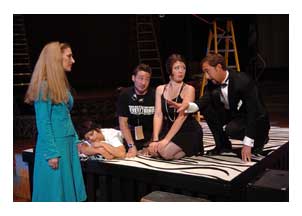
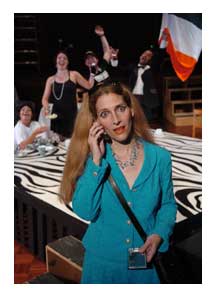
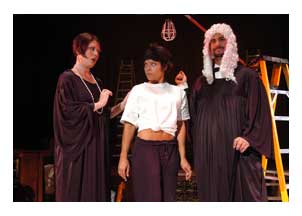
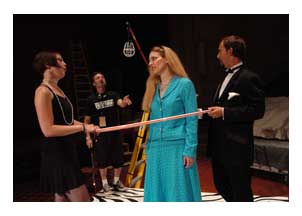
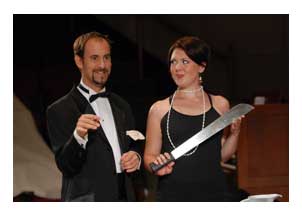
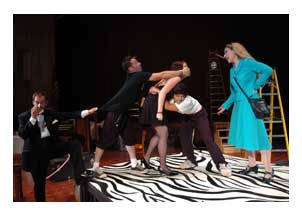
PLAYWRIGHT'S NOTE
Once upon a time I entered a theater’s dressing room, only to discover
a gifted performer in tears. (No, this actor was not in character.) It
was the day of a scathing review. Ordinarily, I’d have been a fairy
godmother, but my wand didn’t even work on me. Instead, I froze.
I really felt there was nothing I could say or do to comfort the actor,
whose humiliation was palpable.
On reflection, I should have approached the actor. I’d done so countless times (as I had with other actors) when the stakes were not as high. After rehearsals, I’d complimented actors for their talent, attitude and discipline. As an artistic director (as well as human being), I’ve found that as long as you’re truthful, it’s easier to praise than to pan.
But the nasty review affected me, too. It “magically” thwarted my innate behavior. Reviews have the power to change us. They can fill slates that might otherwise be blank. And they can promote safety in numbers. If the public’s first or only access to a theatrical experience is a negative review, there’s not much if anything to challenge that.
Public figures often have power because we allow them to. And when someone has power, he can also be prejudiced. While it’s very human to curry favor, let’s be honest here: it’s the hot and spicy opportunities that are the tastiest. So, whether a powerful person favors you because you’re the flavor of the month (safety in numbers again) or because you’re a hot event, hotel, restaurant or theater he’d normally pay through the nose for (twice in some cases), the result can be a good one.
The problem is when dishonesty gives birth to a negative result/review. So, whether a powerful person wakes up on the wrong side of the bed; whether he’s superficially reminded of someone he worked hard to forget; whether he’s filling pseudo-quotas or whether he’s a do-as-I-say-not-as-I-doer, he’s got the power to annihilate an effort. And in the case of a critic, he may be bitter about not having more creative outlets. Though critics can be quite creative. Some even pan the very thing that they themselves have done (often poorly) like puns, rhymes, riddles, assonance, alliteration, anagrams, the list goes on. Some critics go through hoops to prove how clever they are, so that it’s never clear whether they’re rating a play or writing one.
Watching this year’s Winter Olympics was
eye-opening. The potential for
prejudicing spectators while the performance (I mean competition) was
in progress was astonishing. You see, commentators, while they can educate
us, also have the power to sway us. If we like an athlete, they tell us
why. And then we’re happy. If we don’t like one, they tell
us why. And then we’re smart. Either way, we win. Which gives commentators
a lot of power. One commentator mentioned, in reference to an ice-couple,
that they could only suffer by comparison to another team. This was just
as the couple started their routine. How could millions of television
watchers not have been affected by that barb? A commentator, in reference
to another ice-couple, mentioned seeing the couple thinking about their
next move. Let me say the couple’s performance was awesome. And
I didn’t see them thinking. I saw them gliding on ice with passion,
artistry and skill. But if I had seen them thinking, so what? More power
to them for being passionate, artistic, skilled as well as thoughtful.
After all, the ice is risky, and it doesn’t pay to take a risk unless
you’re thinking. (Incidentally, another skater was bashed for not
thinking. A commentator said the skater needed to think through her techniques
because she only jumped and hoped.) At the end of the day, I decided to
think that all the skaters were great even when they fell.
Prejudice is a dishonest, dangerous conceit. Alice in Underwear taps right into this issue. Alison, the anti-heroine, is the biggest bigot. Ironically, she bashes five of my favorite artistic/ethnic cultures. Lewis Carroll fans will recognize my nods to his Alice in Wonderland. (I have been inspired before by Carroll's Alice with my dramedy The Crawl-Space Waltz.) Classical Greek fans will also recognize ancient themes and structures in Alice in Underwear. I’ve long been a devotee of ancient Greek tragedy, mythology and Greek amphitheatres. But if you are neither a Carroll nor a classical buff, it’s quite all right. This play is about much more than my favorite things.
I hope that Alice in Underwear reminds us that
there’s always someone more powerful, no matter who we are …
or think we are. And that whether or not reviews are happily-ever-after,
the ones that count the most are the ones you do for you.
— PAULA ALPRIN
![]()
![]()
web design by Stillwell
Design © 2004 Natural Theatricals LLC
Photography by Stan Barouh
